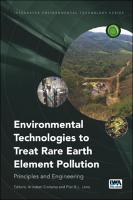Environmental Technologies to Treat Rare Earth Element Pollution
Principles and Engineering
Contributor(s)
Sinharoy, Arindam (editor)
Lens, Piet (editor)
Language
EnglishAbstract
Rare earth elements (REE) have applications in various modern technologies, e.g., semiconductors, mobile phones, magnets. They are categorized as critical raw materials due to their strategic importance in economies and high risks associated with their supply chain. Therefore, more sustainable practices for efficient extraction and recovery of REE from secondary sources are being developed.
This book, Environmental Technologies to Treat Rare Earth Elements Pollution: Principles and Engineering:
presents the fundamentals of the (bio)geochemical cycles of rare earth elements and which imbalances in these cycles result in pollution.
overviews physical, chemical and biological technologies for successful treatment of water, air, soils and sediments contaminated with different rare earth elements.
explores the recovery of value-added products from waste streams laden with rare earth elements, including nanoparticles and quantum dots.
This book is suited for teaching and research purposes as well as professional reference for those working on rare earth elements. In addition, the information provided in this book is helpful to scientists, researchers and practitioners in related fields, such as those working on metal/metalloid microbe interaction and sustainable green approaches for resource recovery from wastes.
Keywords
Water resources / environmentDOI
10.2166/9781789062236ISBN
9781789062243, 9781789062229, 9781789062236Publisher
IWA PublishingPublisher website
https://www.iwapublishing.com/Publication date and place
2022Classification
Environmental science, engineering and technology


 Download
Download Web Shop
Web Shop